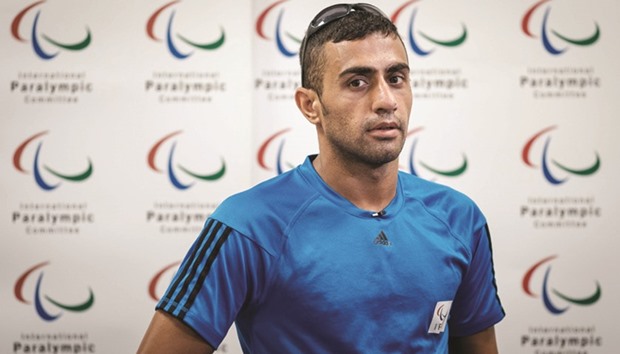Ibrahim al-Hussein is swimming in the Rio Paralympics as a refugee, but the excitement of the event pales against his real dream — returning one day to a peaceful Syria.
In a sense, al-Hussein, 27, is incredibly lucky. He and Iran’s Shahrad Nasajpour have been brought to Rio de Janeiro by the International Paralympic Committee to highlight the plight of refugees.
He hasn’t won a medal but says just being in Brazil “was the reward, to be here. 2016 was my most beautiful year.”
In 2012, al-Hussein, a swimmer, lost his leg after an explosion.
“I was trying to help a friend wounded in an attack and I was injured by another explosion,” he says, adding that he prefers “to forget the past.” He got out and was treated and eventually made it to Athens where he now works in a cafe and won selection to the refugee team.
He’d begun swimming when he was just five along the banks of the Euphrates river with his father, then took up judo at 12. Already as a teen he had Olympic dreams.
“I never imagined my country would have a war one day,” he told AFP.
“After the explosion I lost all hope of continuing sport, since one leg had to be amputated and the other was wounded. My only goal was to walk again.”
In Greece though, he achieved far more. He established a new life and returned to sport, swimming “for four hours every day after work,” and also playing the fast and furious game of wheelchair basketball.
Homeland
In April, al-Hussein was chosen for the token refugee team, which follows a similar gesture made for the first time for the Rio Olympics last month.
He calls for sport to be used to halt conflict and pleads “to stop the bloodbath in Syria.”
With so many of Syria’s athletes having fled the country, he says the European Union, where many of them have sought refuge, “should ease the procedures for athletes to join clubs so that they can keep training.”
“There are many war wounded, people who have had amputations, like me. For the Palestinians, Iraqis and Syrians, the Paralympics are a real goal,” he said.
When the “marvellous experience” of competing in Brazil ends he will return to his life in Athens and, he hopes, prepare for the Tokyo 2020 Games — only this time representing his homeland.
“Let’s be realistic. My country is lost at this moment. But I hope one day the bloodbath will end,” he said.
“I don’t want to go back to my country in the conditions that I left, on a wheelchair,” he said.
How would he like to return?
“Swimming, crossing the Euphrates of my childhood,” he said.

Ibrahim al-Hussein
